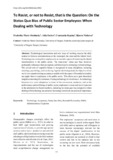Zitierlink:
http://dx.doi.org/10.25819/ubsi/2952Dateien zu dieser Ressource:
| Datei | Beschreibung | Größe | Format | |
|---|---|---|---|---|
| To_Resist_or_not_to_Resist.pdf | 245.11 kB | Adobe PDF |  Öffnen/Anzeigen |
| Dokumentart: | InProceedings | Titel: | To resist, or not to resist, that is the question: on the status quo bias of public sector employees when dealing with technology | AutorInn(en): | Oschinsky, Frederike Marie Stelter, Aida Kaping, Constantin Niehaves, Bjoern |
Institut: | Forschungskolleg “Institute for Advanced Study” (FoKos) | Schlagwörter: | Ethnocentrism, Status Quo Bias, Bounded Rationality, Public Administration, Cognition, Status Quo Verzerrung, Kognition, Öffentliche Verwaltung, Gebundene Rationalität | DDC-Sachgruppe: | 004 Informatik | GHBS-Notation: | QGT | Erscheinungsjahr: | 2020 | Publikationsjahr: | 2020 | Auch erschienen: | Radtke, Jörg (Hrsg.) ; Klesel, Michael (Hrsg.) ; Niehaves, Björn (Hrsg.): New perspectives on digitalization: Local issues and global impact. Siegen: Universitätsbibliothek Siegen, 2020. - DOI http://dx.doi.org/10.25819/ubsi/1894, S. 77 - 84 | Zusammenfassung: | Technological innovations and new ways of working became the daily routine in German administrations at the municipal, the state and the federal level. Technology use among their employees is an essential aspect of mastering the digital transformation in the public sector. The employees’ status quo bias, however, profoundly influences their perception and behaviour in technology-related settings. The critical role of cognitive biases is recognised in many disciplines, including sociology, psychology, and marketing. Against this background, the objective of our work is to expand existing acceptance models with the aspect of bounded rationality and apply them to employees in the public sector. This allows us to gain theoretical insights concerning the resistance of using technology in this domain. As technology becomes ever more ubiquitous in times of the coronavirus pandemic, and as the performance and well-being of public sector employees is more and more important to the administrative board members, including the status quo bias perspective when dealing with technology use presents increasing theoretical and practical importance. |
DOI: | http://dx.doi.org/10.25819/ubsi/2952 | URN: | urn:nbn:de:hbz:467-16415 | URI: | https://dspace.ub.uni-siegen.de/handle/ubsi/1641 | Lizenz: | http://creativecommons.org/licenses/by-nc-nd/4.0/ |
| Enthalten in den Sammlungen: | Publikationen aus der Universität Siegen |
Diese Ressource ist urheberrechtlich geschützt. |
Seitenansichten
796
checked on 24.11.2024
Download(s)
314
checked on 24.11.2024
Google ScholarTM
Prüfe
Prüfe
Diese Ressource wurde unter folgender Copyright-Bestimmung veröffentlicht: Lizenz von Creative Commons


